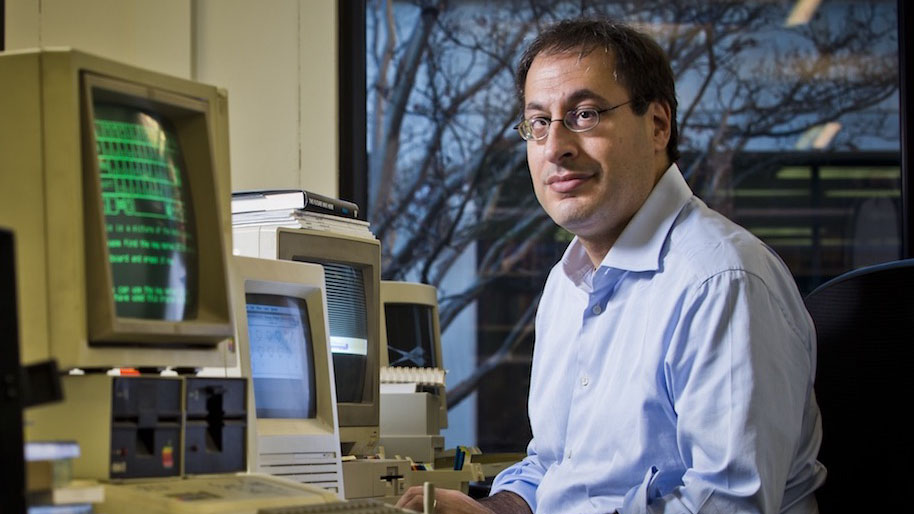Matthew Kirschenbaum Named Distinguished University Professor
August 08, 2023

Kirschenbaum is a renowned researcher, teacher, public intellectual and contributor to media studies, digital humanities, electronic literature and book history.
By Chloe Kim
Matthew Kirschenbaum, professor in the Department of English, was named Distinguished University Professor, the highest appointment bestowed to tenured faculty by the university. Kirschenbaum is a researcher and public intellectual internationally renowned for his contributions to the fields of media studies, digital humanities, electronic literature and book history.
“It’s a tremendous honor, and a very satisfying way of feeling seen and appreciated,” Kirschenbaum said of the recognition.
Kirschenbaum’s interdisciplinary scholarship includes three books on digital media and the history of writing technologies, a volume on game design he co-edited as well as reports and white papers funded by the Andrew W. Mellon Foundation and the National Endowment for the Humanities, among others. He has written for The Washington Post, Slate, Paris Review, The Atlantic, The Chronicle of Higher Education and other public venues. He has been both a Guggenheim and an NEH Fellow.
A recent article he published in The Atlantic called “Textpocalypse” explores humanity’s changing relationship to the written word and is the basis for a book about artificial intelligence he is writing, after the emergence of large language models such as ChatGPT over the past year.
Kirschenbaum is also affiliated with the College of Information Studies at Maryland and a member of the teaching faculty at the University of Virginia’s Rare Book School. He serves as chair of the board of directors of the Society for the History of Authorship, Reading and Publishing.
Kirschenbaum began working with digital media as an undergraduate student in the 1990s at the State University of New York at Albany, where one of his professors was experimenting with new communication technologies such as email and text-based virtual communities.
He pursued his graduate studies in English at the University of Virginia, where he became part of the newly emerging field of digital humanities. He was an early user of the internet and the world wide web and wrote one of the first doctoral dissertations that existed solely online.
“It was tremendously exciting because everything was so new,” Kirschenbaum said.
He began his teaching career with two years at the University of Kentucky. University of Maryland professors Neil Fraistat, now emeritus, and Martha Nell Smith, both of whom Kirschenbaum admired, invited him to UMD for talks before he joined the faculty as an assistant professor in 2001.
Kirschenbaum became the associate director of the Maryland Institute for Technology in the Humanities (MITH) in 2007, serving in the role for 10 years. He helped shape the vibrant interdisciplinary intellectual community that grew around the center dedicated to digital humanities. He has been the principal or co-principal investigator on more than $1 million in grants to the University of Maryland.
In 2008, he published his first book “Mechanisms: New Media and the Forensic Imagination,” which uses computer forensics techniques to study new media forms, such as William Gibson's electronic poem “Agrippa,” famous for encrypting itself after displaying, essentially self-destructing. Investigating digital media as artifacts, just as a book historian might examine physical documents, became the core of Kirschenbaum’s work.
The book received multiple awards, including the 2009 Richard J. Finneran Award from the Society for Textual Scholarship, the 2009 George A. and Jean S. DeLong Prize from the Society for the History of Authorship and the 16th annual MLA Prize for a First Book.
Kirschenbaum co-founded the department’s BookLab, a makerspace, letterpress printing studio, library and center for the book arts, with Kari Kraus, a professor in the College of Information Studies and English, in 2018. Both Kirschenbaum and Kraus had been teaching on book history and book arts, and they wanted to create a collaborative space where students could actually try the activities they were learning about, such as paper-making and letterpress printing.
While some of the technologies in BookLab precede the invention of digital files by many hundreds of years, Kirschenbaum sees a crucial connection between the past and the present.
“All technologies were new at a particular moment in time, and yet they all participate in a fundamental human desire for permanence of expression,” Kirschenbaum said.
Kirschenbaum is also widely recognized for excellence in teaching and mentoring. As the founder and first director of the Design Cultures and Creativity living-learning program in the Honors College, he worked extensively with first-year students, helping orient them around digital expression and creativity. As the founder of the graduate certificate in digital studies in arts and humanities program, he ensured that UMD recognized and credentialed the graduate students focusing on digital humanities and digital studies. He also won the 2021 Graduate English Organization Faculty Service Award, which is bestowed upon faculty who have provided outstanding service to graduate students.
“He really goes all out to help his graduate students. He makes himself available and accessible and he pushes hard for us to be able to get everything out of the degree that we want to do and that says a lot for a mentor,” said Diana Proenza, a Ph.D. candidate in the Department of English.
Ph.D. candidate Nat McGartland, whose work centers around book history and the digital humanities, chose to attend Maryland specifically to work with Kirschenbaum in BookLab.
“Even though he’s a famous scholar, he doesn’t take himself too seriously, and I think that’s so admirable, to still be so down-to-earth,” said McGartland. “He values my work and is a great mentor.”
Kirschenbaum credits his collaborative approach to being able to keep his career “fresh and vital” throughout the decades.
“I think there are moments in the life of institutions and the life of disciplines when you have a particular convergence of people and interests and resources and it sparks to produce something special. It doesn’t always come around on a regular basis. I feel very lucky to have participated in that here,” Kirschenbaum said.

